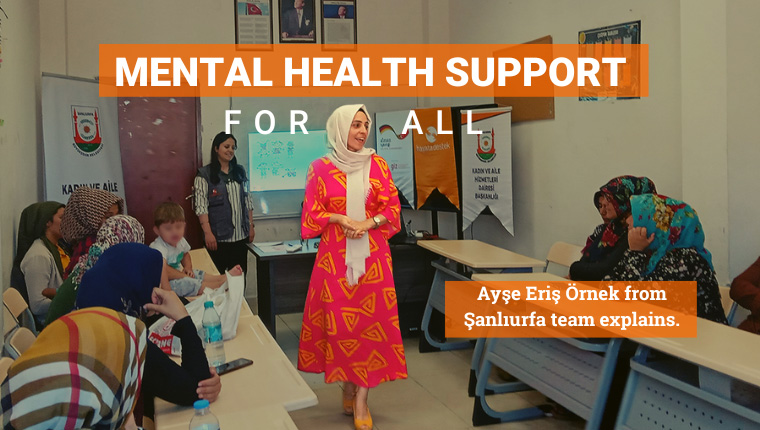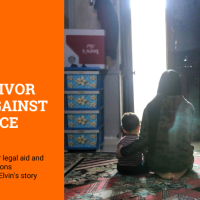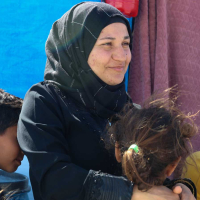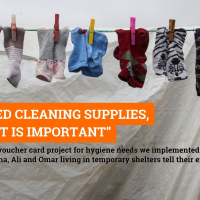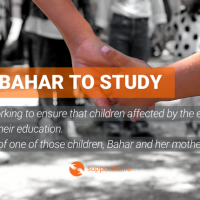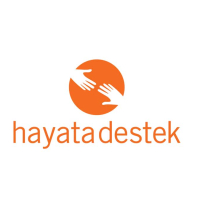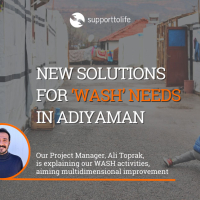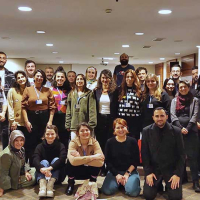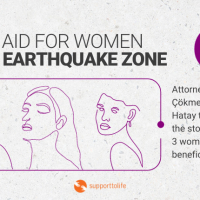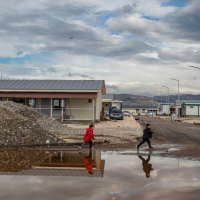Increasing access to mental health and psychosocial support services is of central importance for Support to Life. Our Şanlıurfa MHPSS Team Leader Ayşe Eriş Örnek describes our program that has been in place for 1 year both to ensure this and to reinforce capacities of local governments working in this area.
“I was thinking only those that lost their minds would go to the psychologist and when I go to the psychologist, that would be registered in my record. If I had known this was the case before, I would have received support for my problems way before.”
 This is how the 48-year-old Afra* who joined our psychological awareness seminar in Şanlıurfa, Akçakale describes her changing attitude about mental health and psychosocial support services. This is exactly what is one of our aims as Support to Life; ensuring access of both the local population and refugees to these services, increasing psychosocial wellbeing of the society, making mental health and psychosocial services more accessible to increase their inclusiveness and diversity.
This is how the 48-year-old Afra* who joined our psychological awareness seminar in Şanlıurfa, Akçakale describes her changing attitude about mental health and psychosocial support services. This is exactly what is one of our aims as Support to Life; ensuring access of both the local population and refugees to these services, increasing psychosocial wellbeing of the society, making mental health and psychosocial services more accessible to increase their inclusiveness and diversity.
Therefore, in our project supported by the German Ministry of Federal Economic Cooperation and Development (BMZ) and financed by the German Agency for International Cooperation (GIZ) we established cooperations at the level of İstanbul and Şanlıurfa Metropolitan municipalities. At Şanlıurfa leg of our project we work with Metropolitan Municipality Directorate of Women and Family Services, providing mental health and psychosocial support services to beneficiaries while we also raise capacities of municipality personnel. Let us see together which impact we created in our project that has been in place for 1 year.
Power of Support Groups
In our efforts towards beneficiaries, the support groups we established in the scope of the project occupy an important place. In these groups we aim to reinforce the inner sources that communities already have such as coping, resistance. One of the participants of the support group, the 19-year-old Fatma describes the impact of reinforcement together by saying: “When I came across challenges, I was thinking I was the only one that go through those. Here I understood that I was not alone. We discussed diverse solutions together. Now I feel stronger.”
In the scope of preventive protection activities, we organize informative psycho-training sessions on trauma, anger, stress, the importance of psychological support, interpersonal communication and awareness raising sessions on the importance of mental health.
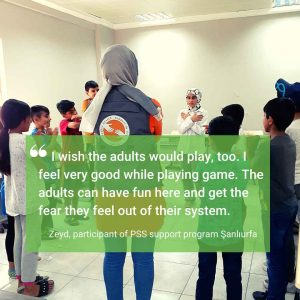 “I Wish the Adults Would Play”
“I Wish the Adults Would Play”
For sure we have activities for the children and games are at the heart of these activities. Especially after the earthquakes on February 6th… Because game in times of crisis supports children to regain their sense of security, helps them make sense of what happens, creating a safe space. Therefore, we mostly played games with children and adolescents that were affected from the disaster. One of the participants of psychosocial support program in Akçakale, the 13-year-old Zeyd explains the therapeutic power of game very well when he says “I wish the adults would play, too. I feel very good while playing game. The adults can have fun here and get the fear they feel out of their system.”
Support to Women’s Support Centers
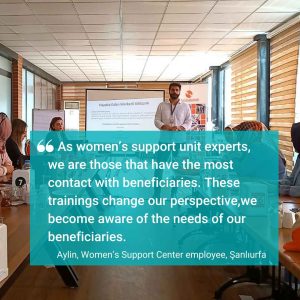 At the heart of the capacity development efforts of our project, there is municipality personnel. Women’s Support Centers are places where women can learn new skills and apply when they request support. At the monthly coordination meetings we conduct with Şanlıurfa Metropolitan Municipality Directorate of Women’s and Family Services, we create roadmap on issues related to mental health and psychosocial support needs of 35 Women’s Support Centers. In addition, we provide trainings to the municipality personnel on psychological first aid, working with sensitive groups, and privacy.
At the heart of the capacity development efforts of our project, there is municipality personnel. Women’s Support Centers are places where women can learn new skills and apply when they request support. At the monthly coordination meetings we conduct with Şanlıurfa Metropolitan Municipality Directorate of Women’s and Family Services, we create roadmap on issues related to mental health and psychosocial support needs of 35 Women’s Support Centers. In addition, we provide trainings to the municipality personnel on psychological first aid, working with sensitive groups, and privacy.
Aylin, who works at one of these centers says the following on our trainings: “As women’s support unit experts, we are those that have the most contact with beneficiaries. These trainings change our perspective,
learn new information, and most importantly become aware of the needs of our beneficiaries”. Master trainer in women’s support center, Nazlı describes the concept of ‘sensitivity’ that affect their work following trainings: “I started to have a distinctive relationship with my students. They talk to me for support when they need it. I believe this was created with the sensitivity you described in training.”
Care-Giving Support Program
We receive positive feedback at our trainings for kindergarten teachers working at Women’s Support Centers. Teachers that attend our parent/caregiver support program sessions may support the beneficiaries they provide services to which have a positive reflection on children. One of the parents that participate in Women’s Support Center, Berna describes the impact on her life by saying: “It turned out that I was giving too much responsibilities to my child. I used to tell him ‘you are my reason to hold on to the life, you give me strength,’ frequently. My child was acting over his age, trying to protect me. Apparently, what I said make him think he had to grow up.”
Starting from the viewpoint that mental health and psychosocial support is not a privilege, but a right, we are continuing our efforts to ensure everybody that needs accesses this support. This is quite valuable for the cooperation we establish with public institutions.
*Names of our beneficiaries and municipality personnel were changed to protect their privacy rights.
Writer: Ayşe Eriş Örnek
MHPSS Team Leader / Şanlıurfa
Editor: Gözde Kazaz
Communication Expert / İstanbul
Thank you for reading the article and for coming this far. Now you can support life while you are here.
